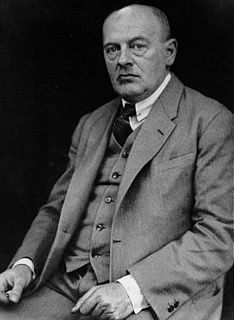A Quote by Oswald Chambers
In the spiritual domain, criticism is love turned sour... If criticism becomes a habit, it will destroy the moral energy of the life and paralyze the spiritual force... Whenever you are in a critical temper, it is impossible to enter into communion with God. Criticism makes you hard and vindictive and cruel, and leaves you with the flattering unction that you are a superior person. It is impossible to develop the characteristics of a saint and maintain a critical attitude.
Quote Topics
Related Quotes
In the spiritual domain, criticism is love turned sour. In a wholesome spiritual life there is no room for criticism. The critical faculty is an intellectual one, not a moral one. If criticism becomes a habit it will destroy the moral energy of the life and paralyse spiritual force. The only person who can criticise human beings is the Holy Spirit.
I take criticism so seriously as to believe that, even in the midst of a battle in which one is unmistakably on one side against another, there should be criticism, because there must be critical consciousness if there are to be issues, problems, values, even lives to be fought for... Criticism must think of itself as life-enhancing and constitutively opposed to every form of tyranny, domination, and abuse; its social goals are noncoercive knowledge produced in the interests of human freedom.
You see an artist, a creative person, can accept criticism or can live with the criticism much more easily than with being ignored. Criticism makes you feel alive. If somebody is bothered enough to speak vituperatively about it, you feel you have touched a nerve and you are at least 'in touch.' You are not happy that he doesn't like it, but you feel you are in contact with life.
I don't have a very high opinion, actually, of the world of criticism - or the practice of criticism. I think I admire art criticism, criticism of painting and sculpture, far more than I do that of say films and books, literary or film criticism. But I don't much like the practice. I think there are an awful lot of bad people in it.
My father was extremely loving to me and funny and wise and understanding, and at other times extremely demanding, critical, calculating, exacting. When you're a young woman, I think you want to please a lot, so maybe you accept more of the criticism than you would as an older person. But criticism can be very wounding. It certainly was to me.
Whenever convictions are not arrived at by direct contact with the world and the objects themselves, but indirectly through a critique of the opinions of others, the processes of thinking are impregnated with ressentiment. The establishment of "criteria" for testing the correctness of opinions then becomes the most important task. Genuine and fruitful criticism judges all opinions with reference to the object itself. Ressentiment criticism, on the contrary, accepts no "object" that has not stood the test of criticism
That was one of the big problems in the [Black Panther] Party. Criticism and self-criticism were not encouraged, and the little that was given often wasn’t taken seriously. Constructive criticism and self-criticism are extremely important for any revolutionary organization. Without them, people tend to drown in their mistakes, not learn from them.
When I first prepared this particular talk... I realized that my usual approach is usually critical. That is, a lot of the things that I do, that most people do, are because they hate something somebody else has done, or they hate that something hasn't been done. And I realized that informed criticism has completely been done in by the web. Because the web has produced so much uninformed criticism. It's kind of a Gresham's Law-bad money drives the good money out of circulation. Bad criticism drives good criticism out of circulation. You just can't criticize anything.






































